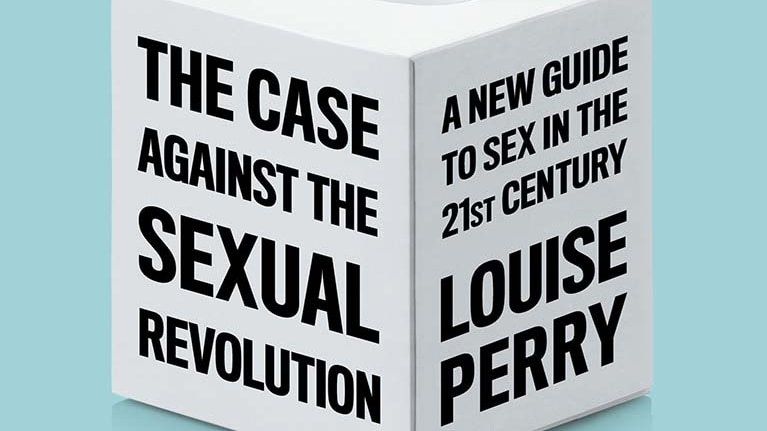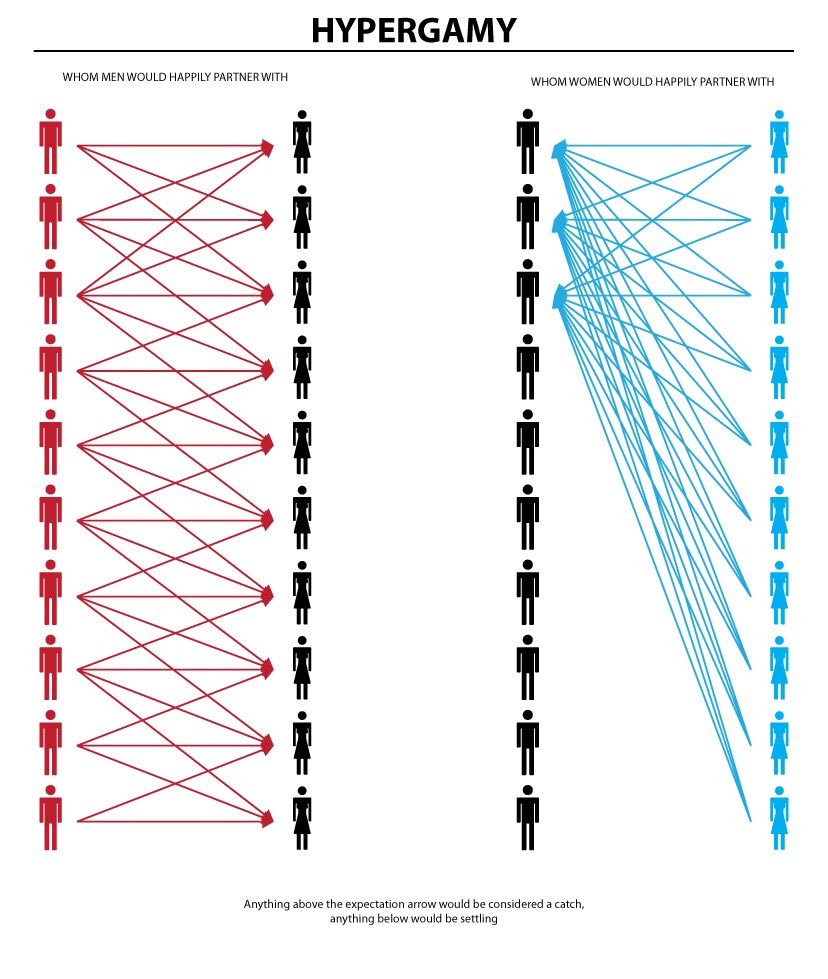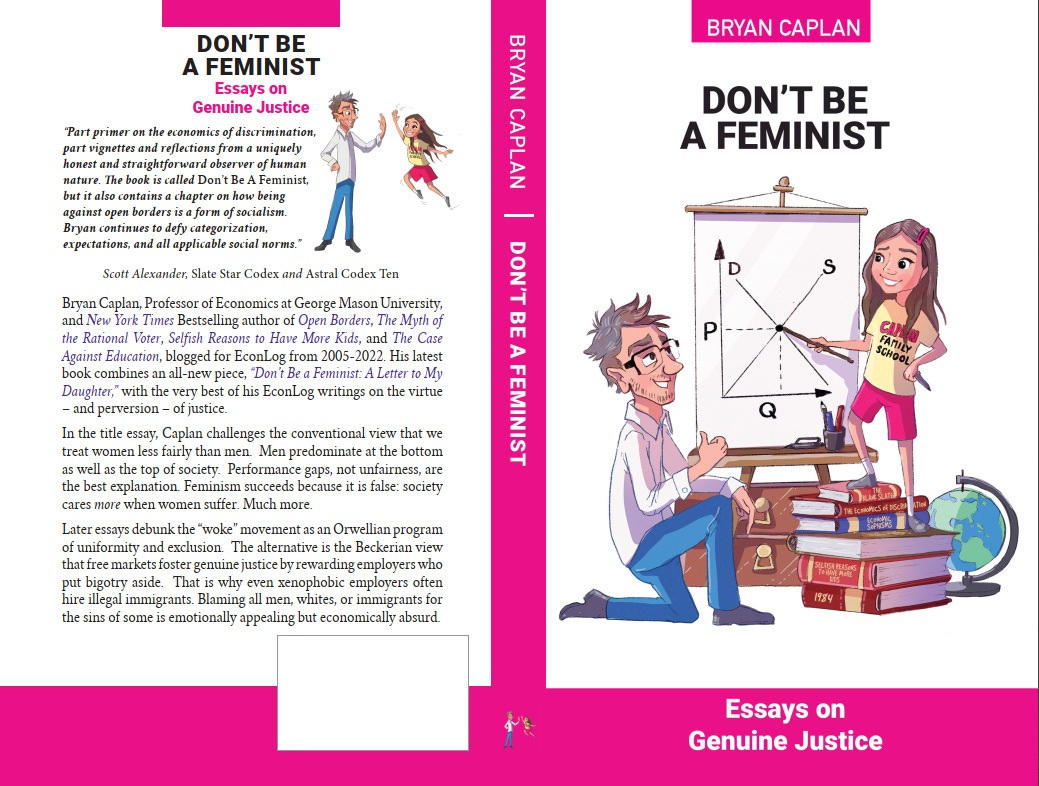I read Louise Perry’s The Case Against the Sexual Revolution: A New Guide to Sex in the 21st Century in a single day. If you want a page-turner, look no further. The sentences are gripping, the anecdotes are shocking, and the thesis is eyebrow-furrowing. For pure entertainment, I honestly don’t think I can compete with this book, which strives to convert today’s young feminists to a heretical syncretic creed of sex-negative feminism and social conservatism. Intellectually, however, the book is in need of improvement.
My chief thoughts:
Many readers will give Perry copious credit for embracing evolutionary psychology in general, and the evolutionary psychology of gender differences in particular. I repeatedly felt this temptation myself. But each time, I asked myself: “When a thinker from a willfully blind intellectual subculture loudly admits the obvious, should we count this as brilliant insight?” If the purpose of praise is simply to give better incentives, then maybe. If a noted creationist publicly converts to Darwinism, perhaps we should throw a parade in his honor. But doesn’t that take “grading on a curve” too far?
Perry accuses mainstream feminism of promoting extreme female promiscuity, despite evidence that this is psychologically harmful for most women. At the same time, she is aware that young people today are having less sex than in the past: “[O]ne perverse feature of the twenty-first-century dating market is that the average young person is now having sex less often than their parents and grandparents once did, and there is an increasingly large and frustrated population of men who remain virgins into their twenties and beyond.” But she never considers the possibility that feminism, on balance, reduces promiscuity by amplifying female antipathy for men.
In her defense, Perry discusses some sex-positive feminists who plausibly are promoting female promiscuity. The obvious story, though, is that feminism reduces the average amount of sex women have while increasing its variance. When you “raise awareness” of male beastliness, most women feel fear and disgust, leading them to raise their standards for men - or avoid them altogether. At the same time, a minority of women have the opposite reaction: If you can’t beat the beasts, join them.
Perry has a whole chapter called “Consent Is Not Enough” which faults other feminists for their sex-positive message of, “All sex between consenting adults is wonderful.” But this is a bizarrely one-sided reading of the contemporary feminist message. Yes, there is a lot of talk of consent. The main purpose of this talk, however, is not to encourage promiscuity, but to raise the bar of what counts as “consent” to absurdly high levels. Most visibly, modern feminists strongly advocate for affirmative consent: “yes means yes” instead of “no means no.” In practice, this means that men are always open to after-the-fact accusations of rape unless they submit to the humiliating and repugnant ritual of repeatedly asking female partners, “Do you now consent to me doing X?”
Many feminists also emphasize that “pressure” vitiates consent. Presumably this even includes affirmative consent. What counts as “pressure”? That’s the wrong question. The right question is: “What definitely doesn’t count as pressure?” Does being upset when a woman refuses sex count as “pressure”? How about saying, “I will break up with you unless we have sex”? Once you start down this path, the honest answer is: “Anything could count as pressure. Anything at all.”
Closely related: Feminists have also tried to raise awareness of “power imbalances” in relationships, with the strong insinuation that women cannot consent to such relationships - or at least that such consent is forever questionable. And they’ve had remarkable success. On the job, romance between superiors and subordinates is virtually illegal. Even romance between co-workers of equal level is semi-illegal - especially if you realize that - job titles aside - no two co-workers are ever truly “equal.” All in the name of an Orwellian redefinition of “consent.”
Upshot: Feminist sermons on “consent” send a mixed message: “All consensual sex is praiseworthy” and “It’s really hard to definitively consent.” The key question is: In practice, what is the mix of these messages? Reading Perry, it sounds like 99:1. But the students I know who have endured mandatory collegiate brainwashing tell me that it’s more than 1:99. While the commissars do call themselves “sex-positive,” this is pro forma. What really obsesses them is the risk that students might somehow mistake non-consent for consent. On the common-sense definition of consent, this is almost impossible. But if you raise the bar enough, it happens all the time.
The Case Against the Sexual Revolution is packed with anti-market rhetoric. We know the free market in goods and services is bad; why on Earth would we want a free-market in love and sex? A typical passage:
Of course the factory owner supports free marketisation, and of course the wage slave disagrees… This is also true in the sexual marketplace, which was once strictly regulated but has now been made (mostly) free.
However, in this case the classes are not the workers and the bourgeoisie but, rather, men and women - or, more precisely, the group of people who have done particularly well out of the free marketisation of sex are men high in the personality trait that psychologists call ‘sociosexuality.’”
Such anti-market cliches are a missed opportunity for Perry - and the women she wants to help. Yes, when people have foolish or wicked preferences, free markets satisfy them. Why? Because free markets are a social mechanism for giving people who have something to offer whatever they want. However, free markets are just as eager to satisfy wise and noble preferences. Instead of denouncing the “free marketisation of sex” or telling us that “people are not products,” Perry should be telling her readers to use the free market to their best advantage.
True, if you have little to offer, the free market won’t give you much in return. The drug-addicted prostitutes that weigh on Perry’s conscience are unlikely to find stable men eager to marry them. But the vast majority of Perry’s intended audience, however, is in very high demand. The mating market puts immense value on young, well-educated women. Which is great news for readers who take Perry’s pro-marriage advice to heart. True, most young, well-educated women won’t be able to marry handsome, charming investment bankers. But if they set their sights a little lower, they can find a good husband fairly easily.
This is especially true if you understand and appreciate how markets work. Suppose a young, well-educated woman finds that none of the men she meets are willing to commit. If she understands and appreciates how markets work, she has two options.
The first is to be a little more flexible and forgiving. Don’t just tell yourself, “He doesn’t have to look like a model”; tell yourself, “I’m not a model either, so why should I look down on him?” Don’t lower your standards resentfully; lower your standards with the understanding that you’ve hitherto been unreasonably demanding.
The second option is self-improvement. Sure, you can try to improve your appearance. But if you’re looking for a long-term relationship, it’s much more important to improve your attitude. Above all, strive to rid yourself of the deep antipathy toward normal men that permeates Perry’s book. You can accept evolutionary psychology’s truism that men are much hornier than women without looking at normal men as loathsome perverts.
Perry says many true things about biologically-rooted gender differences. But she one-sidedly focuses on gender differences that make women look better than men. This isn’t merely unfair and inaccurate; it is counterproductive if you want to help women find fulfilling long-term relationships. What omissions do I have in mind?
To start, Perry never even uses the words “hypergamy” or “hypergamous.” So while she accurately describes male lust for many women, she neglects female lust for the very best men. Yet the slogan that “Men are naturally polygamous; women are naturally hypergamous” is basic evolutionary psychology. Misandrists and misogynists use one of these two truisms to denigrate the opposite gender. Misanthropes use both of these two truisms to denigrate both genders. Wise people, however, use one truism to become a better partner - and the other to find a better partner. Avoid temptation - and find a mate who does the same. Men in relationships should avoid spending time alone with attractive women - and women should prefer to be with men who avoid such temptations. Women in relationships should avoid spending time alone with successful men - and men should prefer to be with women who avoid such temptations.
Perry’s discussion of personality gender gaps is similarly one-sided. Yes, women are, in terms of the Five Factor Model, more Agreeable. They are kinder and gentler than men. Yet they are also notably higher in Neuroticism. Even if women’s situation is objectively good, they are more prone than men to sadness, anxiety, resentment, and other negative emotions. Perry’s call for men to control their natural feelings is totally sensible, but it’s a two-way street. Men should try to be kinder and gentler. Women should try to be more content and resilient. This isn’t just common decency; such self-improvement ultimately gives you higher value in the mate market and better relations with whatever partner you have.
At risk of overstatement, The Case Against the Sexual Revolution offers female readers zero happy options. Hook-up culture is terrible, but Perry’s own choice of marriage and motherhood also sounds bleak:
I’ve written earlier in this book about the conflicts between liberal feminists and radical feminists on issues such as prostitution and porn… On motherhood, however, the differences have always been paper thin. Both groups have no answer to the question of how women are supposed to reconcile their search for freedom with a condition that necessarily curtails it.
If you value freedom above all else, then you must reject motherhood, since this is a state of being that limits a woman’s freedom in almost every possible way - not only during pregnancy but also for the rest of her life, since she will always have obligations to her children, and they will always have obligations to her…
Some feminists insist that women ought to forego motherhood altogether… This does work up to a point - for the individual, at least, if not for the species. But it isn’t possible to reject dependency altogether because, even if a women chooses never to have children, she will one day grow old and depend on other people as if she were an infant all over again.
If this sounds like an objective description of harsh realities, I submit that you have a severely Neurotic personality. You are projecting your negative emotionality onto a big package of good and bad. Easy for a dad like me to say? Well, I’m not just a father of four; I exceed the 99th percentile of paternal involvement. I handled every nightshift for every baby. Solo. That includes a pair of twins. I’ve been homeschooling - again, solo - for almost ten years. During Covid, I homeschooled all four of our kids. And through all of this, I never thought my kids “limited my freedom” in the slightest. For me, being a father is a privilege. As I often tell my kids, they are not an interruption of my work. They are my work. And my pride and joy.
What goes for parenting also goes for life. Neurotic people project their negative emotionality onto whatever they see. Perry is horrified by hook-up culture, male sexual psychology, Hugh Hefner, porn, sex work, 50 Shades of Gray, and beyond. But it’s hard to imagine her looking at any human society and unironically declaring, “Wow, this is just fantastic, glorious, and inspiring.” Yes, I know that she can’t help being fundamentally Neurotic any more than I can help being fundamentally Disagreeable. But a little self-awareness goes a long way. I know I’m Disagreeable, so I strive to be nicer to people. Once you know you’re Neurotic, similarly, you should strive to see the good in life.
Louise Perry combines feminist values with scientific facts to argue for a traditional lifestyle. An intriguing synthesis, I grant. Still, if I knew a man who was dating a Perry fan, I would strongly advise him to find someone else to marry. You don’t want to spend your life with someone who considers you the least-bad of their poor options. You don’t want to spend your life with someone who expresses strong disgust for the typical psychology of your whole gender. You don’t want to spend your life with someone who refuses to sympathetically see life from your point of life once in a while. While I don’t think that Perry explicitly promotes any of these traits, the subtext is overwhelming.
What would I advise men to look for? To start, a woman who can smile and shrug at normal gender differences. To continue, a woman capable of sincerely admiring a man who has normal male feelings. At minimum, a woman who doesn’t hold you collectively guilty for the sins of the worst men.
Why should women care what men want, anyway? Because the mating market, like other markets, rewards self-improvement of every kind. Adam Smith famously quipped, “It is not from the benevolence of the butcher, the brewer, or the baker, that we expect our dinner, but from their regard to their own interest.” If you bake better bread in the consumer’s eyes, you get more money. If you become a better woman in men’s eyes, you get a better man. I am only a messenger.
But isn’t there more to love than a quid pro quo? Sure, because there is more to every market than a quid pro quo! As Dale Carnegie eloquently teaches in his How to Win Friends and Influence People, the best way to succeed socially is to attain a sincere appreciation of the good in other people. So if you want to find a good partner, don’t merely pretend to care about the feelings of the opposite sex. Learn to really do so. This is standard advice for men. It should be standard advice for women, too.
To repeat, The Case Against the Sexual Revolution is excellent in many ways. Seriously, it may be my favorite feminist book of all time.
Once Perry convinces you that many standard feminist orthodoxies are absurd dogmas, though, you really should dig deeper. How often does any intellectual movement bimodally combine a bunch of absurd dogmas with piles of deep wisdom? Isn’t it more likely that feminism combines its many absurd dogmas with subtle mistakes, half-truths, truisms, and yes, a little deep wisdom? If that’s all your movement has to offer, I say you should salvage what little you can and leave. What is the meta-lesson of Perry’s book? I’ve said it before and I’ll say it again: Don’t be a feminist.
Subscribe to Bet On It
Caplan and Candor











On point 2. Though I haven’t read the book, based on your summary... and experience raising 8 daughters:
The argument that feminism reduces promiscuity if flawed IMHO for several reasons.
The first one being that, I attribute the reduction in sex, frequency more to video games and the Internet and social media then I do to feminism. It just so happens that feminism was amplified by the Internet and social media.
I think a better evaluation would be looking at what sort of sex the fewer people that are having. I just watched the final episode of the excellent Netflix series Beef, and in the final episode, there was a conversation about how choking during sex has become main stream because of the Internet, yet it wasn’t something that kids raised in the 80s or 90s even thought about. The same could be said about the prevalence of anal sex, and a wide variety of other sexual behaviors.
Ultimately, I think we have a two pronged problem here. On one hand, a certain flavor of feminism has encourage young women to be more promiscuous than they would’ve otherwise been. The other issue is with young men basically taking them cells off the market because they’re spending all the time watching porn or playing video games.
The combination of the two means there is fewer young men than women out there who are on the market, so the young men who are having sex, are willing to push the limits and expect less monogamous type relationships. And the young women out there who are trying to find a mate, and with the influence of the certain brand of feminism, I’m more willing to acquiesce to these male desires.
My antidotal perception based on working with a lot of young, single 20 and 30 something years old guys and having raised eight girls is basically that the men with charm/looks/balls get laid often and easily. Way more than their peers from earlier generations. Meanwhile, women in their teens and 20s have a lot less selection of men who are worth dating.
If there are any grammatical errors, I apologize… I dictated this while sitting in my car in a parking lot.
This article performs a valuable service. Your critique of Perry's book is so thorough, I can now move on, confident I don't have to read it myself. Thanks!